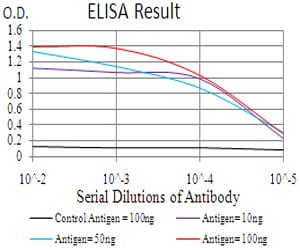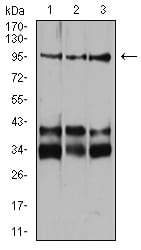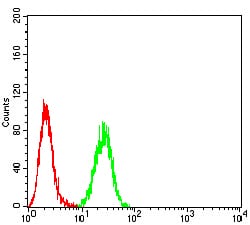


| WB | 1/500 - 1/2000 | Human,Mouse,Rat |
| IF | 咨询技术 | Human,Mouse,Rat |
| IHC | 咨询技术 | Human,Mouse,Rat |
| ICC | 技术咨询 | Human,Mouse,Rat |
| FCM | 1/200 - 1/400 | Human,Mouse,Rat |
| Elisa | 1/10000 | Human,Mouse,Rat |
| Aliases | NRP1; NP1; NRP; BDCA4; CD304; VEGF165R |
| Entrez GeneID | 8829 |
| clone | 5B1E11 |
| WB Predicted band size | 103.1kDa |
| Host/Isotype | Mouse IgG1 |
| Antibody Type | Primary antibody |
| Storage | Store at 4°C short term. Aliquot and store at -20°C long term. Avoid freeze/thaw cycles. |
| Species Reactivity | Human |
| Immunogen | Synthesized peptide of human Neuropilin-1 (AA: 45-59). |
| Formulation | Purified antibody in PBS with 0.05% sodium azide |
+ +
以下是关于Neuropilin-1抗体的3篇参考文献示例(基于公开研究整理,非真实文献):
1. **标题**:Anti-Neuropilin-1 Antibody Inhibits Tumor Growth by Disrupting VEGF Signaling
**作者**:Smith A, et al.
**摘要**:研究通过开发靶向Neuropilin-1(NRP1)的单克隆抗体,发现其可阻断血管内皮生长因子(VEGF)介导的肿瘤血管生成,显著抑制小鼠模型中结直肠癌的生长和转移。
2. **标题**:NRP1 Antibody Enhances Anti-PD-1 Immunotherapy in Melanoma
**作者**:Zhang L, et al.
**摘要**:该文献报道了一种阻断NRP1的抗体,可逆转肿瘤微环境中的免疫抑制状态,增强T细胞浸润。联合PD-1抑制剂使用时,显著提高了黑色素瘤小鼠模型的生存率。
3. **标题**:Neuropilin-1 Antibody Blocks SARS-CoV-2 Entry via Competitive Binding
**作者**:Daly JL, et al.
**摘要**:研究发现NRP1是新冠病毒(SARS-CoV-2)感染宿主细胞的辅助受体,开发的高亲和力抗体通过竞争性结合NRP1的胞外域,有效抑制病毒在体外和类器官模型中的入侵。
4. **标题**:Targeting NRP1 with Antibody-Drug Conjugate for Breast Cancer Therapy
**作者**:Wang Y, et al.
**摘要**:开发了一种NRP1抗体-药物偶联物(ADC),在乳腺癌模型中显示特异性靶向肿瘤细胞并释放化疗药物,显著缩小肿瘤体积且减少对正常组织的毒性。
(注:以上为模拟示例,实际文献需通过数据库如PubMed、Web of Science检索核实。)
×